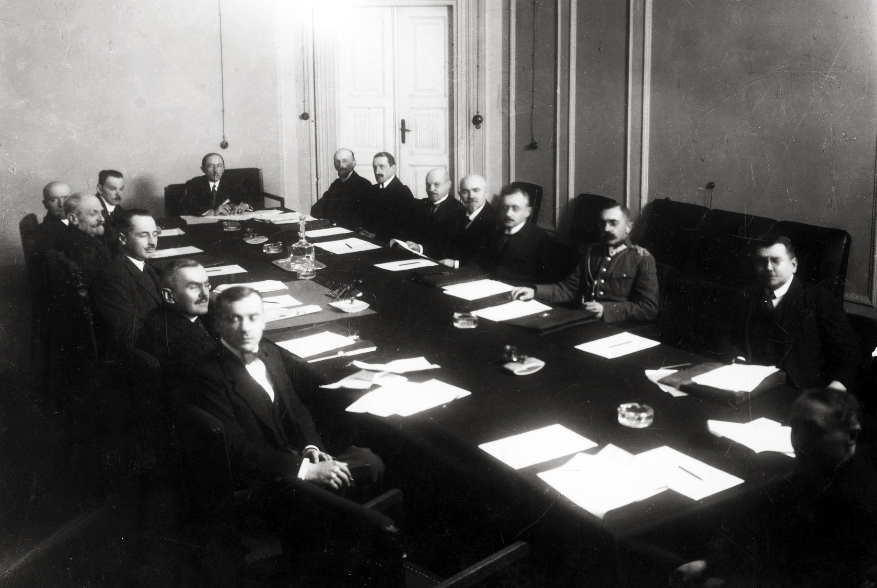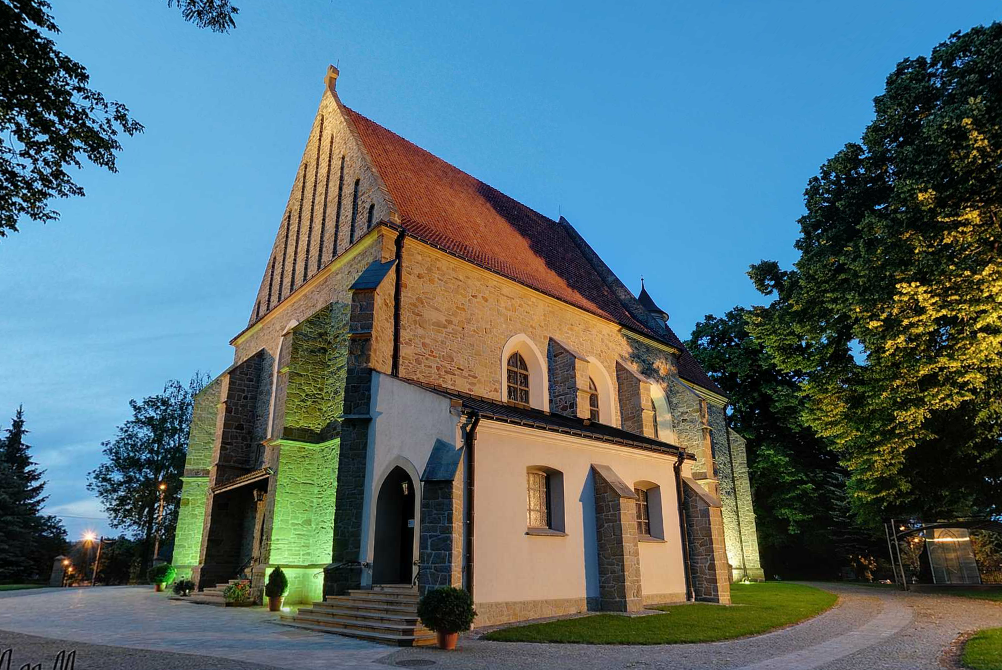|
Piotr Jaroszewicz
Gen. Piotr Jaroszewicz (; 8 October 1909 – 1 September 1992) was a post World War II Polish political figure. He served as the Prime Minister of Poland between 1970 and 1980. After he was forced out of office he lived quietly in a suburb of Warsaw until his murder in 1992. Life and career Jaroszewicz was born on 8 October 1909 in Nieśwież, in the Minsk Governorate of the Russian Empire (present-day Belarus). After finishing the secondary school in Jasło he started working as a teacher and headmaster in Garwolin. After the outbreak of World War II and the Nazi-Soviet alliance established by the Molotov–Ribbentrop Pact he moved to Soviet-occupied zone of Poland. It has been claimed that he was a headmaster in Pinsk gymnasia. However, on 10 July 1940 he was deported to Slobodka, Krasnoborski region, Arkhangelsk, from Stolin together with his first wife Oksana Gregorevna (born in Salov/Calow 1914) and daughter Olila (born 1940). In 1943 he joined the 1st Polish Army of Gen. Z ... [...More Info...] [...Related Items...] OR: [Wikipedia] [Google] [Baidu] |
Prime Minister Of Poland
The President of the Council of Ministers ( pl, Prezes Rady Ministrów, lit=Chairman of the Council of Ministers), colloquially referred to as the prime minister (), is the head of the cabinet and the head of government of Poland. The responsibilities and traditions of the office stem from the creation of the contemporary Polish state, and the office is defined in the Constitution of 1997. According to the Constitution, the president nominates and appoints the prime minister, who will then propose the composition of the Cabinet. Fourteen days following their appointment, the prime minister must submit a programme outlining the government's agenda to the Sejm, requiring a vote of confidence.Article 154, para. 2 Conflicts stemming from both interest and powers have arisen between the offices of President and Prime Minister in the past. The incumbent and seventeenth prime minister is Mateusz Morawiecki of the Law and Justice party. Morawiecki replaced Prime Minister Beata Szydło, ... [...More Info...] [...Related Items...] OR: [Wikipedia] [Google] [Baidu] |
Poland
Poland, officially the Republic of Poland, is a country in Central Europe. It is divided into 16 administrative provinces called voivodeships, covering an area of . Poland has a population of over 38 million and is the fifth-most populous member state of the European Union. Warsaw is the nation's capital and largest metropolis. Other major cities include Kraków, Wrocław, Łódź, Poznań, Gdańsk, and Szczecin. Poland has a temperate transitional climate and its territory traverses the Central European Plain, extending from Baltic Sea in the north to Sudeten and Carpathian Mountains in the south. The longest Polish river is the Vistula, and Poland's highest point is Mount Rysy, situated in the Tatra mountain range of the Carpathians. The country is bordered by Lithuania and Russia to the northeast, Belarus and Ukraine to the east, Slovakia and the Czech Republic to the south, and Germany to the west. It also shares maritime boundaries with Denmark and Sweden. ... [...More Info...] [...Related Items...] OR: [Wikipedia] [Google] [Baidu] |
Anin, Warsaw
Anin is a subdistrict of Wawer, in south-east Warsaw Warsaw ( pl, Warszawa, ), officially the Capital City of Warsaw,, abbreviation: ''m.st. Warszawa'' is the capital and largest city of Poland. The metropolis stands on the River Vistula in east-central Poland, and its population is officia .... References Neighbourhoods of Warsaw Wawer{{Wawer ... [...More Info...] [...Related Items...] OR: [Wikipedia] [Google] [Baidu] |
Central Committee
Central committee is the common designation of a standing administrative body of Communist party, communist parties, analogous to a board of directors, of both ruling and nonruling parties of former and existing socialist states. In such party organizations, the committee would typically be made up of delegates elected at a party congress. In Communist state, those states where it constituted the state power, the central committee made decisions for the party between congresses and usually was (at least nominally) responsible for electing the politburo. In non-ruling communist parties, the central committee is usually understood by the party membership to be the ultimate decision-making authority between congresses once the process of democratic centralism has led to an agreed-upon position. Non-communist organizations are also governed by central committees, such as the right-wing Likud party in Israel, the North American Mennonite Central Committee, Mennonite Church and Alcoholic ... [...More Info...] [...Related Items...] OR: [Wikipedia] [Google] [Baidu] |
COMECON
The Council for Mutual Economic Assistance (, ; English abbreviation COMECON, CMEA, CEMA, or CAME) was an economic organization from 1949 to 1991 under the leadership of the Soviet Union that comprised the countries of the Eastern Bloc along with a number of socialist states elsewhere in the world. The descriptive term was often applied to all multilateral activities involving members of the organization, rather than being restricted to the direct functions of Comecon and its organs. This usage was sometimes extended as well to bilateral relations among members because in the system of communist international economic relations, multilateral accords typically of a general nature tended to be implemented through a set of more detailed, bilateral agreements. Comecon was the Eastern Bloc's response to the formation in Western Europe of the Marshall Plan and the OEEC, which later became the OECD. Name in official languages of the members History Foundation The Comecon was fo ... [...More Info...] [...Related Items...] OR: [Wikipedia] [Google] [Baidu] |
Polish Workers Party
The Polish Workers' Party ( pl, Polska Partia Robotnicza, PPR) was a communist party in Poland from 1942 to 1948. It was founded as a reconstitution of the Communist Party of Poland (KPP) and merged with the Polish Socialist Party (PPS) in 1948 to form the Polish United Workers' Party (PZPR). From the end of World War II the PPR ruled Poland, with the Soviet Union exercising moderate influence. During the PPR years, the conspiratorial as well as legally permitted centers of opposition activity were largely eliminated, while a communist (also characterized as socialist) system was gradually established in the country. Arriving from the Soviet Union, a group of Polish communists was parachuted into occupied Poland in December 1941. With Joseph Stalin's permission, in January 1942 they established the Polish Workers' Party, a new communist party. The PPR established a partisan military organization ''Gwardia Ludowa'', later renamed ''Armia Ludowa''. In November 1943, Władysław G ... [...More Info...] [...Related Items...] OR: [Wikipedia] [Google] [Baidu] |
Zygmunt Berling
Zygmunt Henryk Berling (27 April 1896 – 11 July 1980) was a Polish general and politician. He fought for the independence of Poland in the early 20th century. Berling was a co-founder and commander of the First Polish Army, which fought on the Eastern Front of World War II. Military career before World War II Zygmunt Berling was born in Limanowa, then part of the Austro-Hungarian Empire, on 27 April 1896. He joined the Polish Legions of Józef Piłsudski in 1914, serving in the 2nd and 4th Legions Infantry Regiment (''Pułk Piechoty Legionów''). Between the "oath crisis" of June 1917 and October 1918 he served in the Austro-Hungarian Army. At the end of the World War I he joined the reborn Polish Army, becoming the commander of an infantry company in the 4th Infantry Regiment. During the Polish–Soviet War, he gained fame as an able commander during the Battle of Lwów and received the Virtuti Militari medal. After the war, he remained in the military and in 1923 he was p ... [...More Info...] [...Related Items...] OR: [Wikipedia] [Google] [Baidu] |
First Polish Army (1944–1945)
The Polish First Army ( pl, Pierwsza Armia Wojska Polskiego, 1 AWP for short, also known as Berling's Army) was an army unit of the Polish Armed Forces in the East. It was formed in the Soviet Union in 1944, from the previously existing Polish I Corps in the Soviet Union, as part of the People's Army of Poland (LWP). The First Army fought westward, subordinated to the Soviet 1st Belorussian Front, during the offensive against Nazi Germany that led to the capture of Warsaw in January 1945, and the capture of Berlin in May 1945. Formation The First Army was formed in the Soviet Union in 1944, from the previously existing Polish I Corps as part of the People's Army of Poland (LWP). On 10 August 1943, the Soviets gave permission for enlarging the Polish 1st Tadeusz Kościuszko Infantry Division into a Corps ( Polish I Corps).Grzelak, p. 101 The new formation was to be composed of two infantry divisions, one artillery and one armor brigade, one support and one air regiment, four inde ... [...More Info...] [...Related Items...] OR: [Wikipedia] [Google] [Baidu] |
Molotov–Ribbentrop Pact
, long_name = Treaty of Non-Aggression between Germany and the Union of Soviet Socialist Republics , image = Bundesarchiv Bild 183-H27337, Moskau, Stalin und Ribbentrop im Kreml.jpg , image_width = 200 , caption = Stalin and Ribbentrop shaking hands after the signing of the pact in the Kremlin , type = , date_drafted = , date_signed = , location_signed = Moscow, Soviet Union , date_sealed = , date_effective = , condition_effective = , date_expiration = 23 August 1949(planned)22 June 1941( terminated)30 July 1941( officially declared null and void) , signatories = Joachim von Ribbentrop Vyacheslav Molotov , parties = , depositor = , languages = , wikisource = Molotov–Ribbentrop Pact The Molotov–Ribbentrop Pact was a non-aggression pact between Nazi Germany and the Soviet Union that enabled those powers to partition Poland between them. The pact was signed in Moscow on 23 August 1939 by German Foreign Minister Joachim von Ribbentrop and Soviet Foreign Minister Vyacheslav ... [...More Info...] [...Related Items...] OR: [Wikipedia] [Google] [Baidu] |
Garwolin
Garwolin is a town on the Wilga river in eastern Poland, capital of Garwolin County, situated in the southeast part of the Garwolin plateau in Masovian Voivodeship, 62 km southeast of Warsaw, 100 km northwest of Lublin. As of December 2021, the town has 17,566 inhabitants. History The name of the town occurs in the medieval notes in 1386 and 1404. Name Garwolin comes from a Garwoł, which is a name. However, there is a popular legend connecting the town's name with rooks (Polish: ''gawrony''). Traces of settlement on terrains of present days boundaries of Garwolin are more than 2000 years old. It is believed that Garwolin received its city charter in 1423, but the exact date is unknown; it is almost certain that the document from 1423 was only acknowledgement of before-stated city laws. In time of the Deluge casualties exceeded 90%. During the Polish–Soviet War, the town was captured and briefly occupied by the invading Russians, before it was recaptured by the Pol ... [...More Info...] [...Related Items...] OR: [Wikipedia] [Google] [Baidu] |
Jasło
Jasło is a county town in south-eastern Poland with 36,641 inhabitants, as of 31 December 2012. It is situated in the Subcarpathian Voivodeship (since 1999), and it was previously part of Krosno Voivodeship (1975–1998). It is located in Lesser Poland, in the heartland of the Doły (Pits), and its average altitude is 320 metres above sea level, although there are some hills located within the confines of the city. The Patron Saint of the city is Saint Anthony of Padua. History In the early days of Polish statehood, Jasło was part of the Castellany of Biecz, out of which ''Biecz County'' emerged in the 14th century. A list of rectories, created for collecting tithes, a church in "Jassel" in Zręcin deanery, Kraków diocese, is shown in 1328.Sulimierski, Filip, Bronisław Chlebowski, and Władysław Walewski. ''Słownik Geograficzny Królestwa Polskiego I Innych Krajów Słowiańskich: Warszawa 1880-1902''. Translated by William F. "Fred" Hoffman. Warszawa: BUW. Sekcja Dok ... [...More Info...] [...Related Items...] OR: [Wikipedia] [Google] [Baidu] |

_1989%2C_MiNr_3221.jpg)


